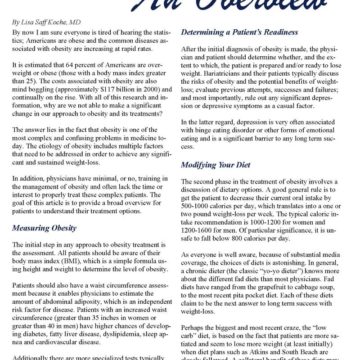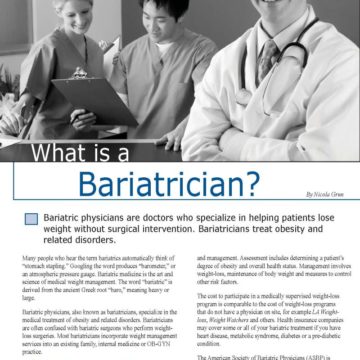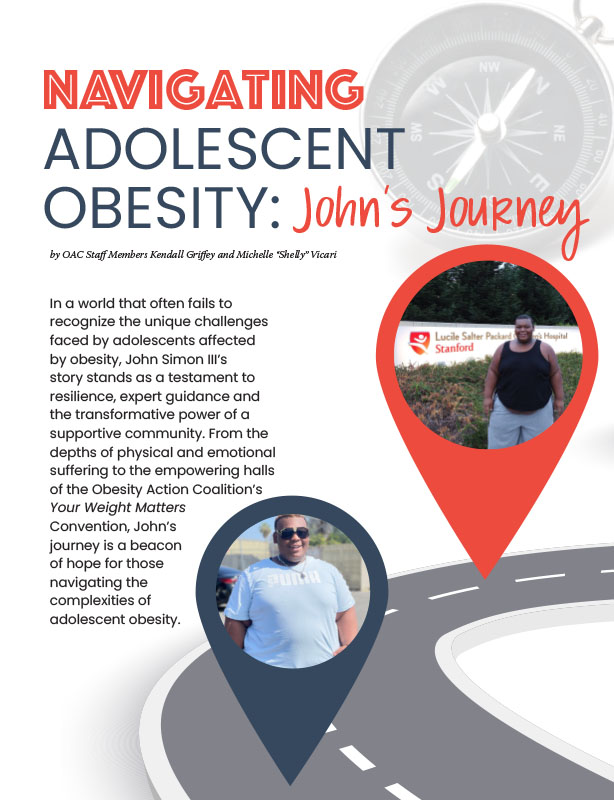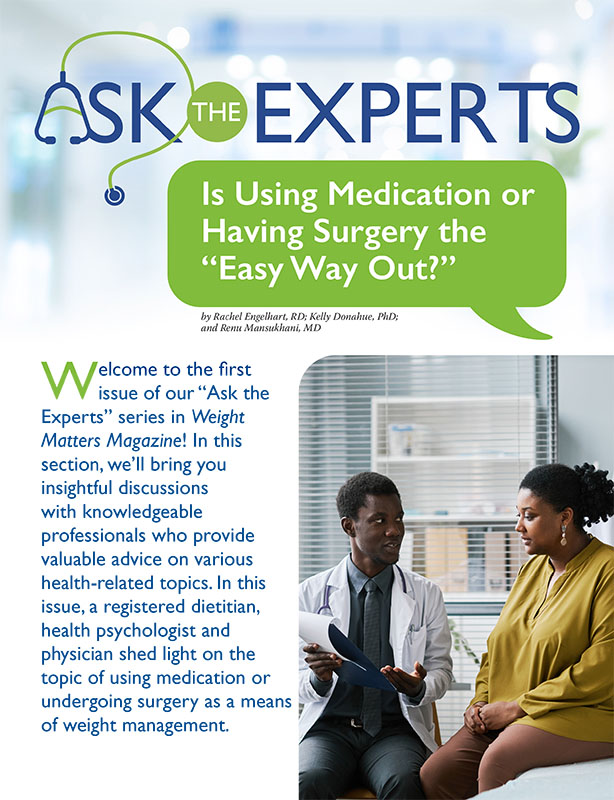I am a Bariatric Surgery Patient. Which medications are recommended and which ones should I avoid?

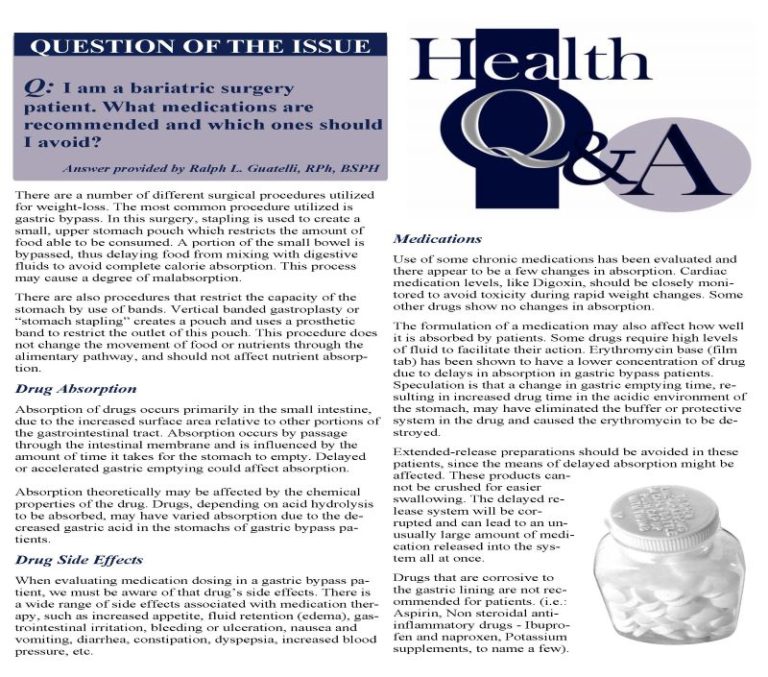
by Ralph L. Guatelli, RPh, BSPH
Fall 2005
There are a number of different surgical procedures utilized for weight-loss. The most common procedure utilized is gastric bypass. In this surgery, stapling is used to create a small, upper stomach pouch which restricts the amount of food able to be consumed. A portion of the small bowel is bypassed, thus delaying food from mixing with digestive fluids to avoid complete calorie absorption. This process may cause a degree of malabsorption.
There are also procedures that restrict the capacity of the stomach by use of bands. Vertical banded gastroplasty or “stomach stapling” creates a pouch and uses a prosthetic band to restrict the outlet of this pouch. This procedure does not change the movement of food or nutrients through the alimentary pathway, and should not affect nutrient absorption.
Drug Absorption
Absorption of drugs occurs primarily in the small intestine, due to the increased surface area relative to other portions of the gastrointestinal tract. Absorption occurs by passage through the intestinal membrane and is influenced by the amount of time it takes for the stomach to empty. Delayed or accelerated gastric emptying could affect absorption.
Absorption theoretically may be affected by the chemical properties of the drug. Drugs, depending on acid hydrolysis to be absorbed, may have varied absorption due to the decreased gastric acid in the stomachs of gastric bypass patients.
Drug Side Effects
When evaluating medication dosing in a gastric bypass patient, we must be aware of that drug’s side effects. There is a wide range of side effects associated with medication therapy, such as increased appetite, fluid retention (edema), gastrointestinal irritation, bleeding or ulceration, nausea and vomiting, diarrhea, constipation, dyspepsia, increased blood pressure, etc.
Medications
Use of some chronic medications has been evaluated and there appear to be a few changes in absorption. Cardiac medication levels, like Digoxin, should be closely monitored to avoid toxicity during rapid weight changes. Some other drugs show no changes in absorption.
The formulation of a medication may also affect how well it is absorbed by patients. Some drugs require high levels of fluid to facilitate their action. Erythromycin base (film tab) has been shown to have a lower concentration of drug due to delays in absorption in gastric bypass patients. Speculation is that a change in gastric emptying time, resulting in increased drug time in the acidic environment of the stomach, may have eliminated the buffer or protective system in the drug and caused the erythromycin to be destroyed.
Extended-release preparations should be avoided in these patients, since the means of delayed absorption might be affected. These products cannot be crushed for easier swallowing. The delayed release system will be corrupted and can lead to an unusually large amount of medication released into the system all at once.
Drugs that are corrosive to the gastric lining are not recommended for patients. (i.e.: Aspirin, Non-steroidal anti-inflammatory drugs – Ibuprofen and naproxen, Potassium supplements, to name a few).
As gastric bypass patients, you must protect yourselves. When your physician prescribes a drug for you, ask questions. Remind him or her that you are a gastric bypass patient. Request to know the effects of the drug(s) as they pertain to you. You may need to change your primary doctor to one who is knowledgeable of gastric bypass and patient needs.
Educate Yourself
Utilize your pharmacists. Pharmacists are experts in medication action and usage. If they do not have an immediate answer for you, they can research information in a short period of time. Select a pharmacy that you trust. “Select your pharmacist as you would select your doctor” is an old saying. You can also access various Web sites on the Internet for answers to your medication questions.
Until more research is done in this area, there are no standard rules for adjustments of medications following gastric bypass. Many patients are able to stop drug therapy for chronic conditions such as diabetes and hypertension. However, patients taking any medications should be monitored for both toxicity and increased side effects. Drugs whose dose has been established based on weight criteria should be frequently evaluated as weight-loss continues to occur.
Medications to Avoid:
- Advil
- Alka-Seltzer
- Vanquish
- Aspirin
- Bufferin
- Coricidin
- Cortisone
- Excedrin
- Fiorinal
- Ibuprofen
- Motrin
- Pepto-Bismol
Medications Recommended for Colds
- Benadryl
- Dimetapp
- Robitussin
- Sudafed
- Triaminic
- Tylenol Cold Products
Medications Usually Well Tolerated
- Panadol
- Tylenol
- Gas-X
- Phazyme
- Tylenol Extra Strength
- Dulcolax Suppositories
- Fleet Enemas
- Glycerin Suppositories
About the Author:
Ralph L. Guatelli, RPH, BSPH, is currently a Pharmacy Operations Manager for PMSI of PharMerica, Inc. located in Brandon, Fla. Mr. Guatelli has also taught a pharmaceutical course at Florida Metropolitan University for the past two years.
by Kendall Griffey, OAC Communications Manager Spring 2024 We have officially kicked off Your Weight Matters Regional…
Read Articleby OAC Staff Members Kendall Griffey and Michelle “Shelly” Vicari Winter 2024 In a world that often…
Read Articleby Rachel Engelhart, RD; Kelly Donahue, PhD; and Renu Mansukhani, MD Summer 2023 Welcome to the first…
Read Article




